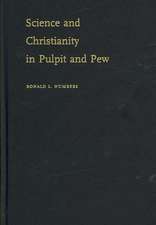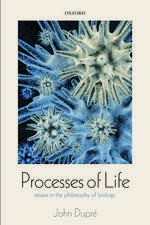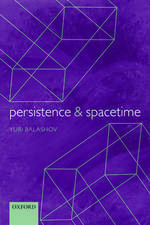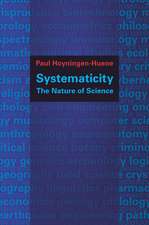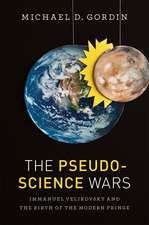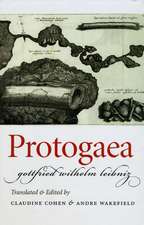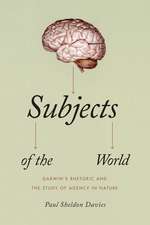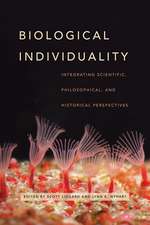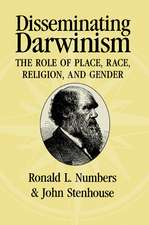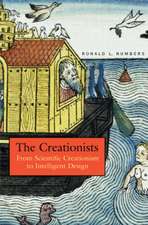Biology and Ideology from Descartes to Dawkins
Editat de Denis R. Alexander, Ronald L. Numbersen Limba Engleză Paperback – 24 mai 2010
Denis R. Alexander and Ronald L. Numbers bring together fourteen experts to examine the varied ways science has been used and abused for nonscientific purposes from the fifteenth century to the present day. Featuring an essay on eugenics from Edward J. Larson and an examination of the progress of evolution by Michael J. Ruse, Biology and Ideology examines uses both benign and sinister, ultimately reminding us that ideological extrapolation continues today. An accessible survey, this collection will enlighten historians of science, their students, practicing scientists, and anyone interested in the relationship between science and culture.
Preț: 392.77 lei
Nou
Puncte Express: 589
Preț estimativ în valută:
75.17€ • 78.18$ • 62.05£
75.17€ • 78.18$ • 62.05£
Carte tipărită la comandă
Livrare economică 15-29 aprilie
Preluare comenzi: 021 569.72.76
Specificații
ISBN-13: 9780226608419
ISBN-10: 0226608417
Pagini: 448
Ilustrații: 30 halftones, 1 line drawing
Dimensiuni: 152 x 229 x 30 mm
Greutate: 0.61 kg
Editura: University of Chicago Press
Colecția University of Chicago Press
ISBN-10: 0226608417
Pagini: 448
Ilustrații: 30 halftones, 1 line drawing
Dimensiuni: 152 x 229 x 30 mm
Greutate: 0.61 kg
Editura: University of Chicago Press
Colecția University of Chicago Press
Notă biografică
Denis R. Alexander is director of The Faraday Institute for Science and Religion, St. Edmund’s College, Cambridge, and has worked in the biological research community for the past forty years. Ronald R. Numbers is Hilldale Professor of History of Science and Medicine at the University of Wisconsin-Madison and the coeditor of , also published by the University of Chicago Press.
Cuprins
Introduction
Denis R. Alexander and Ronald L. Numbers
Chapter 1. The cultural authority of natural history in early modern Europe
Peter Harrison
Chapter 2. Biology, atheism, and politics in eighteenth-century France
Shirley A. Roe
Chapter 3. Eighteenth-century uses of vitalism in constructing the human sciences
Peter Hanns Reill
Chapter 4. Biology in the service of natural theology: Paley, Darwin, and the Bridgewater Treatises
Jonathan R. Topham
Chapter 5. Race, empire, and biology before Darwinism
Sujit Sivasundaram
Chapter 6. Darwin’s choice
Nicolaas Rupke
Chapter 7. Biology and the emergence of the Anglo-American eugenics movement
Edward J. Larson
Chapter 8. Genetics, eugenics, and the Holocaust
Paul Weindling
Chapter 9. Darwinism, Marxism, and genetics in the Soviet Union
Nikolai Krementsov
Chapter 10. Evolution and the idea of social Progress
Michael Ruse
Chapter 11. Beauty and the beast? Conceptualizing sex in evolutionary narratives
Erika Lorraine Milam
Chapter 12. Creationism, intelligent design, and modern biology
Ronald L. Numbers
Chapter 13. The ideological uses of evolutionary biology in recent atheist apologetics
Alister E. McGrath
Acknowledgments
Notes
Contributors
Index
Denis R. Alexander and Ronald L. Numbers
Chapter 1. The cultural authority of natural history in early modern Europe
Peter Harrison
Chapter 2. Biology, atheism, and politics in eighteenth-century France
Shirley A. Roe
Chapter 3. Eighteenth-century uses of vitalism in constructing the human sciences
Peter Hanns Reill
Chapter 4. Biology in the service of natural theology: Paley, Darwin, and the Bridgewater Treatises
Jonathan R. Topham
Chapter 5. Race, empire, and biology before Darwinism
Sujit Sivasundaram
Chapter 6. Darwin’s choice
Nicolaas Rupke
Chapter 7. Biology and the emergence of the Anglo-American eugenics movement
Edward J. Larson
Chapter 8. Genetics, eugenics, and the Holocaust
Paul Weindling
Chapter 9. Darwinism, Marxism, and genetics in the Soviet Union
Nikolai Krementsov
Chapter 10. Evolution and the idea of social Progress
Michael Ruse
Chapter 11. Beauty and the beast? Conceptualizing sex in evolutionary narratives
Erika Lorraine Milam
Chapter 12. Creationism, intelligent design, and modern biology
Ronald L. Numbers
Chapter 13. The ideological uses of evolutionary biology in recent atheist apologetics
Alister E. McGrath
Acknowledgments
Notes
Contributors
Index
Recenzii
“Essential.”
“These fascinating, well-referenced, discussions, covering such causes célèbres as Paley, Lysenko, and Dawkins, will surely be of value to the teacher and student, to practicing scientist and those interested in the relationship between science and society.”
“A gripping book on the grey area between the use and abuse of biology for ideological purposes. Eugenics, racism and sexism, apologias for theism, vitalism, and atheism are just a few of the agendas that have shaped, and been shaped by, biological theory. Describing extrapolations that have often added to the sum of human suffering, the essays here, from distinguished historians of science, are authoritative, compelling, and disturbing.”


